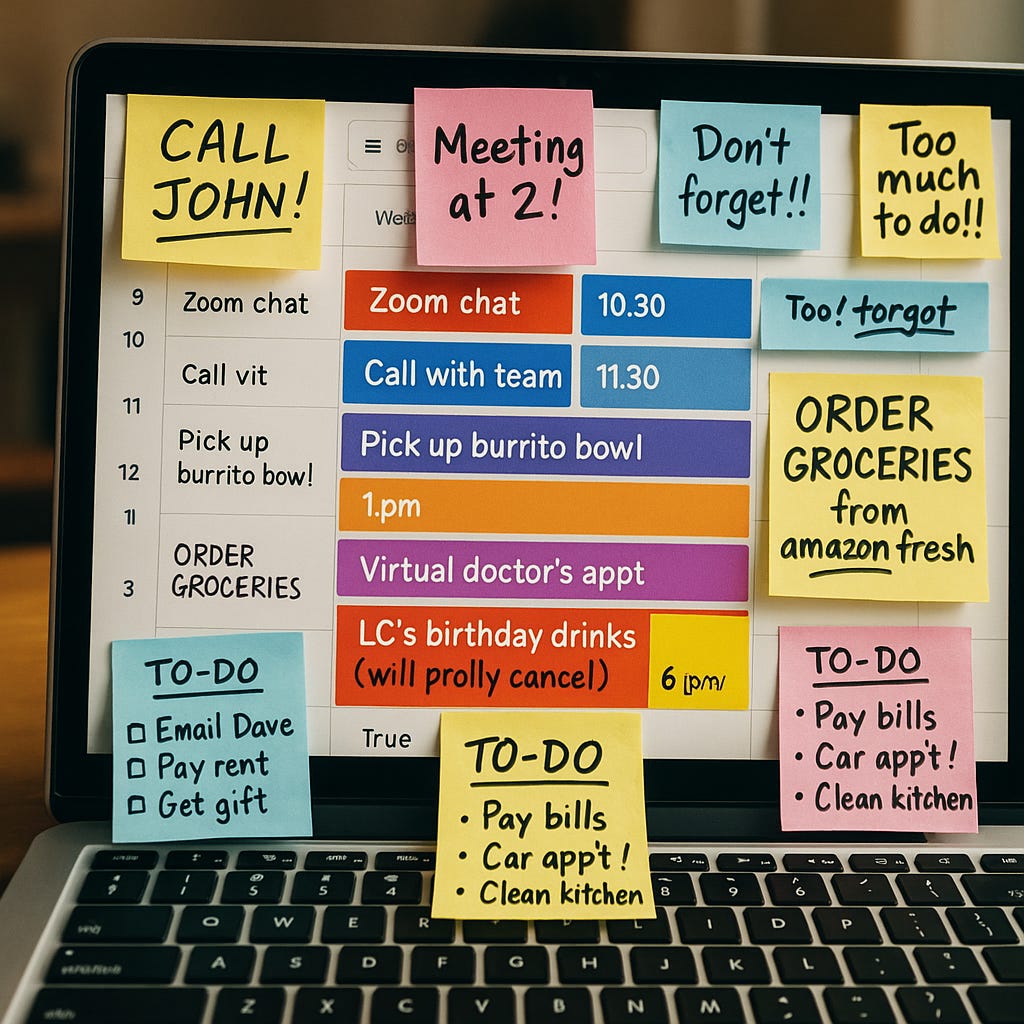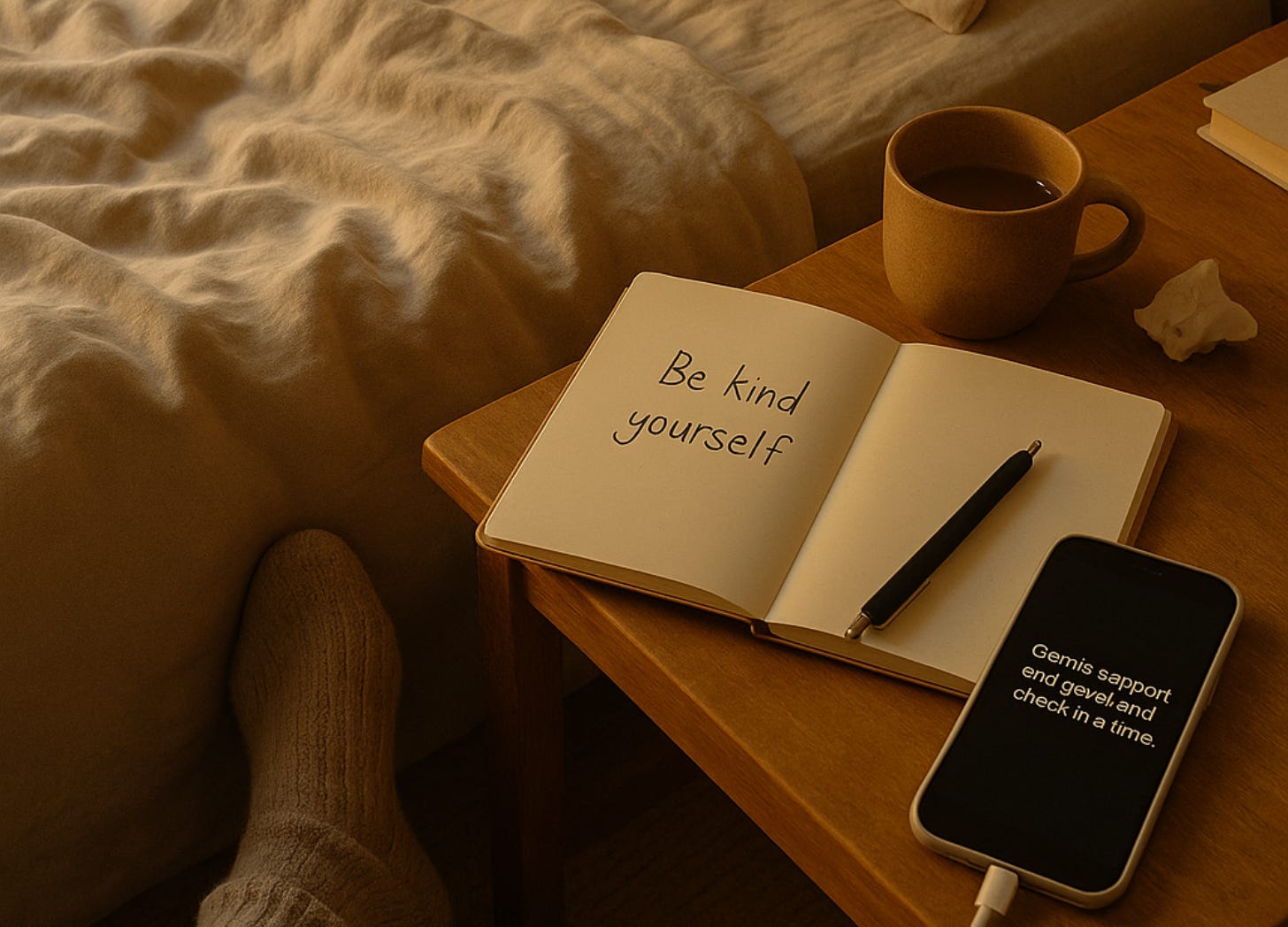When Self-Care Starts to Feel Like Work
Reclaiming care as something intuitive, a little messy, deeply personal, and not performative.
It starts innocently enough: a little lavender essential oil here, a five-minute meditation app there. Maybe you add a Sunday face mask or start a gratitude journal. You don’t want to go full “that girl,” but hey, who doesn’t want to feel a little more balanced?
Then somehow, without warning, your attempt at rest has a checklist.
Morning sunlight? Check.
Ten-minute journaling? Check.
Green smoothie with flaxseeds and “adaptogens” (still not sure what those are)? Check.
Now smile. Not too much. You're centered. Serene. A vision of wellness. Namaste.
Only... you’re exhausted. And not just because you had to wake up at 6am to wellness yourself (is that a thing?).
Welcome to modern self-care: a booming industry where the line between tending to yourself and performing your own emotional labor is blurrier than your steamed-up eucalyptus shower (I do love the smell of eucalyptus body wash though).
The rise of self-care
Let’s be clear: the concept of self-care didn’t start with skincare routines or aesthetically pleasing planners. It has roots in community care, mental health advocacy, and resisting burnout, especially among marginalized groups. In Audre Lorde’s words, “Caring for myself is not self-indulgence, it is self-preservation.” And I do agree wholeheartedly.
But somewhere along the way, capitalism saw a ripe opportunity.
Today, the U.S. wellness market is estimated at around $480 billion, a staggering ecosystem that includes, but is certainly not limited to, bubble baths, apps, journals, supplements, and gym memberships. You can buy a bath bomb for every mood, a curated “emotional support water bottle,” and a journal designed to optimize your soul. There are entire TikTok feeds whispering, “You could be calmer if you just spent $45 on this linen-blend robe.” Really?
The intention, of course, isn’t all bad. People do need care. And it’s true that small rituals (lighting a candle, putting on comfy socks, setting boundaries) can be genuinely nourishing. But the problem arises when care stops being something that replenishes us and becomes just another thing we think we’re failing at. Because suddenly, not doing a gratitude list means you’re ungrateful. Skipping a skincare step means you’re slacking. Cancelling your Pilates class? A betrayal of your best self.
Even rest has a productivity metric now. Did you nap? Great. But did you optimize that nap?
When care becomes a chore
Here’s the uncomfortable truth: even good things lose their magic when they become obligations.
There’s a moment, often subtle, when self-care stops feeling like care and starts feeling like homework. You go from genuinely wanting to take a walk to internally negotiating it like a hostage situation. (“Okay, just put on the leggings. You don’t have to enjoy it. You just have to do it.”)
Some signs it might be happening:
You feel guilty for not meditating “enough.”
You’re annoyed that journaling didn’t solve your anxiety in three pages or less.
You feel trapped in a “routine” you don’t even like, but feel afraid to abandon it; like one skipped yoga session might trigger a full emotional collapse.
There’s a particular kind of burnout that comes not from doing too much, but from trying so hard to do the right things for yourself, and never quite feeling like you’re succeeding.
The pressure to do self-care correctly can backfire hard. It adds one more invisible standard to an already crowded mental checklist, especially if you're already prone to perfectionism, overthinking, or, you know, being a sentient human in late-stage capitalism.
🌀 When self-care triggers anxiety instead of easing it
And for those of us living with anxiety (hi, it’s us), self-care doesn’t always feel like a soft exhale. Sometimes, even the kindest routines start to feel like one more spinning plate, except the plate is on fire, and you’re expected to deep-breathe your way through it. That’s when care stops feeling like support and starts feeling like a moving target with really bad timing.
What was meant to be soothing starts to feel like pressure. The calm you’re trying to cultivate feels just out of reach; like you’re chasing a moving target with breathwork and apps and rituals that somehow leave you more tense than before.
This is where anxiety loops thrive: in the gap between what we think we should do to “be okay” and what actually helps us feel safe, soothed, or just stable.
If that’s you? You’re not doing it wrong. Your nervous system just needs care that meets it where it’s at; not where the algorithm says it should be.
Who is it all for?
That’s the question that sneaks in when you’re halfway through a dry brush tutorial you found on TikTok: Who is this actually for?
Sometimes, without realizing it, our care routines become performances; a way of looking like we’ve got it together even when we’re crumbling inside. It’s easier to post your color-coded planner than to admit you cried over nothing this morning. It’s more comforting to say, “I’m working on my mindset,” than to say, “Honestly, I’m just tired of pretending I’m okay.”
And let’s face it: social media doesn’t help. We’re bombarded with curated snapshots of people “soft launching” their new routines: diffused light, peaceful vibes, linen sheets. Rarely do we see someone lying on the floor eating string cheese in sweatpants muttering, “This is self-care. I swear.”
But maybe it should be.
Because if your self-care is something you feel pressured to document, perfect, or defend, it might be time to ask if it’s actually helping you at all.
Reclaiming care as personal (and sometimes messy)
Here’s the good news: real self-care doesn’t require a Pinterest board. It doesn’t have to look good, make sense to anyone else, or follow a three-step plan.
Sometimes it looks like skipping your affirmations because sleep mattered more. Sometimes it’s eating crackers for dinner because cooking would’ve pushed you over the edge. Sometimes it’s deleting the habit tracker altogether.
Care is personal. And often, it’s messy.
We forget that “taking care” of ourselves is an evolving relationship, not a fixed set of behaviors. It’s not about doing more to be well. It’s about listening better to what you actually need. Which, yes, might be a walk. But it might also be a long nap, a solo car scream, or watching the same comfort show for the fifteenth time.
The point is: care doesn’t have to be cute. It just has to feel like relief.
The quiet, gentle version
There’s a version of self-care that doesn’t yell at you to improve. That doesn’t ask you to optimize, manifest, or hustle your way into inner peace. That version feels more like a soft exhale than a glow-up.
It might start with simply asking, “What would actually help me feel okay right now?” Not forever. Not ideally. Just now.
And if the answer is “absolutely nothing,” then you’re not broken; you’re just human. Sometimes the most caring thing you can do is lower the bar. Radically. You’re allowed to stay in the in-between.
Because rest shouldn’t feel like work. And taking care of yourself shouldn’t come with performance reviews. Sometimes the most healing thing you can do is drop the routine and let yourself just be.
And… also because emotional healing isn’t always grand gestures, here’s a little honest check-in from me:
One thing that grounded me this week:
Letting a slower version of myself take the lead. She’s less productive, but way more honest.

One thing that ungrounded me:
By the end of the week, I filled my calendar like “doing more” meant I was finally back to normal. (Spoiler: it didn’t.)
Your turn. What’s one small thing that grounded or ungrounded you this week?
If you’re new here, here’s your soft landing.



loved this you nailed it on the head. I’m sure a lot of us feel like self-care has gotten kinda over-the-top lately but FOMO keeps us going along with it anyway. Glad someone finally said it out loud